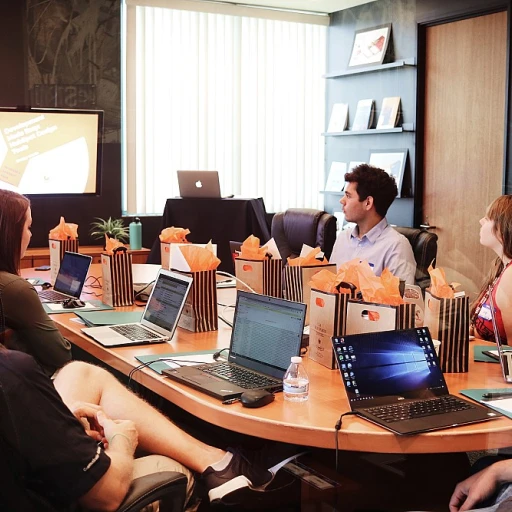Understanding the Need for Upskilling in Today's Job Market
Recognizing the Demand for Enhanced Skills in the Workforce
In today's rapidly evolving job market, the need for continuous skill development has never been more pressing. As businesses strive for innovation and sustainable growth, employees are expected to keep pace with new technologies and industry trends. This demand has made upskilling an essential component of career progression and business success.
The growing emphasis on strategic management and leadership development points to a broader trend where corporate and executive training are no longer optional but crucial. Leadership training programs are designed to help senior leaders adapt and build skills that foster inclusive leadership and support them in overcoming modern business challenges.
- Lifelong learning helps individuals stay relevant in their career and contributes to professional growth.
- Adapting to new technological advancements is necessary for business success, reinforcing the significance of continuous training.
- Organizations increasingly invest in development programs to nurture innovative and proficient leaders.
Executive programs cater to leaders who wish to refine their strategic decision-making capabilities, ensuring they remain competitive in their roles. These programs emphasize the need for skills-based learning as part of a tailored approach to professional development.
For those seeking personalized guidance, exploring avenues for enhancing executive skills can be beneficial. By aligning personal career goals with the right development initiatives, individuals can position themselves strategically in their respective fields. For a deeper dive into how these opportunities align with career objectives, consider exploring the insights on automated skill matching.
Identifying Top-Tier Skill-Building Programs
Exploring Premier Skill-Building Options
In navigating the complexities of today’s job market, it's essential to have a solid grasp on the dynamic landscape of skill enhancement. Identifying top-tier skill-building programs can dramatically influence one’s career trajectory and future advancement within any industry. When selecting the best programs, consider how they incorporate leadership, innovation, and professional development into their curriculum. Many programs, especially executive leadership or management training, focus on developing skills crucial for burgeoning leaders and senior leaders in the field. These courses emphasize strategic growth and sustainable development. Here's a closer look at some highly regarded programs:- Leadership Development Programs: Often tailored for executive leaders, these programs concentrate on refining leadership skills, offering insight into inclusive leadership and continuous learning opportunities. They are designed to produce effective leaders equipped to drive a business forward.
- Corporate Training and Executive Programs: These initiatives are pivotal for career growth, focusing on practical applications that help build skills relevant to today's competitive business environment. They frequently include management courses, executive training, and leadership programs that gear professionals towards advancing their roles within their organizations.
Evaluating Program Effectiveness
Assessing the Efficiency of Skill-Enhancing Initiatives
When exploring the plethora of skill-building programs available, it's crucial to evaluate their effectiveness in fostering real-world development. The right choice can greatly impact your career growth, while an ill-suited one might yield negligible benefits. Here’s how you can determine a program’s value:
- Learning Outcomes: Begin by examining the program's learning outcomes. Do they align with your career aspirations and the demands of your current role? Effective programs usually offer clear pathways to achieving executive leadership and other in-demand abilities.
- Instructor Credentials: Evaluate the instructors’ expertise. Reputable executive programs will generally employ seasoned senior leaders or industry experts to lead their coursework, ensuring that participants receive cutting-edge knowledge and practices.
- Participant Feedback: Gathering insights from past participants can provide a realistic picture of a program’s strengths and weaknesses. Testimonials or reviews may highlight how a program helped participants build skills and advance in their careers.
- Practical Application: The integration of real-world projects or case studies in training programs is a strong indicator of a program’s quality. Such elements ensure that learning goes beyond theory, equipping you with strategic and management skills applicable in practical scenarios.
- Continuous Learning Opportunities: A well-rounded program offers avenues for continuous learning, allowing for sustainable growth by remaining adaptable to emerging trends. Look for programs that nurture innovation executive capabilities and facilitate ongoing professional development.
By critically assessing these facets, you increase your chances of partaking in top-tier skill-building ventures. Remember, an investment in your skillset is a pivotal step toward becoming a leader in your field and driving your career forward. For more tips on assessing effective programs, check out this insightful guide.
Balancing Work, Life, and Upskilling
Sustaining Balance in a Fast-Paced World
Navigating the realm of upskilling while maintaining harmony in personal and professional domains can be challenging. Yet, many individuals seek to achieve this balance to ensure sustainable growth and career advancement. One key strategy is to integrate learning into everyday life, making it a natural extension rather than an intrusion. Many leadership development programs and executive programs offer flexible formats, allowing participation in training sessions during non-working hours or through online platforms. This flexibility is vital to accommodate the busy schedules of senior leaders and employees alike. Corporate training and professional development initiatives can also be designed to align with strategic management goals. This alignment ensures that skill building occurs in conjunction with leadership training, which supports organizational objectives while fostering personal growth. To facilitate seamless integration, businesses can create inclusive leadership environments that encourage continuous learning. By offering supportive resources, such as mentorship or access to executive leadership development, organizations help individuals to balance work demands with the pursuit of new skills. Furthermore, communication is pivotal. Top leaders and managers should openly discuss time commitments and expectations with their teams. By promoting transparency, leaders build trust and demonstrate how upskilling initiatives contribute to both career advancement and business innovation. As the business landscape continues to evolve, innovation executives and senior leaders must prioritize both personal development and corporate training to remain competitive. By fostering an inclusive and supportive atmosphere, organizations empower employees to confidently embrace professional growth opportunities.Financial Considerations and Funding Options
Funding Upskilling: A Strategic Investment
Embarking on upskilling programs can be an incredible way to enhance your career trajectory and professional development. However, the financial aspect of enrolling in top-tier courses and executive programs can present a challenge. Therefore, evaluating your financial considerations is key to sustainable growth.
First, consider your current financial situation and allocate funds specifically for skills-based development programs. This strategic management of resources will help ensure you don’t face unexpected shortfalls.
Another essential aspect to explore is whether your employer can assist in funding your continuous learning. Many businesses understand the value of leadership development and offer corporate training incentives or reimbursements to help employees build skills essential for innovation and strategic growth within their role.
Exploring External Funding Options
When employer assistance isn't available, external funding options can bridge the gap. Several possibilities include:
- Scholarships and Grants: Many organizations and educational institutions offer scholarships or grants for individuals involved in leadership programs or professional development initiatives. Applying for these can substantially reduce the financial burden.
- Loans: Student loans aren't only for degree programs. Many financial institutions offer loans specifically tailored for short-term courses and executive leadership programs.
- Online Platforms: With the rise of e-learning, numerous online platforms provide affordable or even free training programs and courses. Embracing these resources can be a cost-effective way to engage in skill-building.
Each funding source will have its requirements, so thorough research is crucial to determine the best option for your career advancement journey.
Future Trends in Skill-Building
Anticipating the Future of Skill Development
As we look toward the future, the landscape of skill-building is set to evolve dramatically. With rapid technological advancements and changing business dynamics, continuous learning will become a cornerstone of career advancement. Here are some key trends that will shape the future of skill development:
- Emphasis on Leadership Development: As organizations seek to nurture future leaders, leadership programs will become more prevalent. These programs will focus on building skills in strategic management, inclusive leadership, and executive leadership, ensuring that senior leaders are well-equipped to drive innovation and sustainable growth.
- Integration of Technology in Learning: The use of AI and machine learning in training programs will enhance personalized learning experiences. This will help tailor courses to individual needs, optimizing the development process and ensuring that employees build the skills necessary for their specific roles.
- Focus on Soft Skills: While technical skills remain crucial, there will be a growing recognition of the importance of soft skills such as communication, problem-solving, and adaptability. Leadership training will increasingly incorporate these elements to prepare individuals for the complex challenges of the modern workplace.
- Corporate Training and Professional Development: Companies will invest more in corporate training programs that align with their strategic goals. By fostering a culture of continuous learning, businesses can ensure that their workforce remains competitive and innovative.
- Shift Towards Skills-Based Hiring: As discussed in earlier sections, the focus will shift from traditional qualifications to skills-based assessments. This trend will influence how training programs are designed, emphasizing practical, hands-on learning experiences.
The future of skill-building is promising, with numerous opportunities for individuals to enhance their careers through targeted development programs. By staying informed and proactive, professionals can position themselves as valuable assets in their respective fields.












